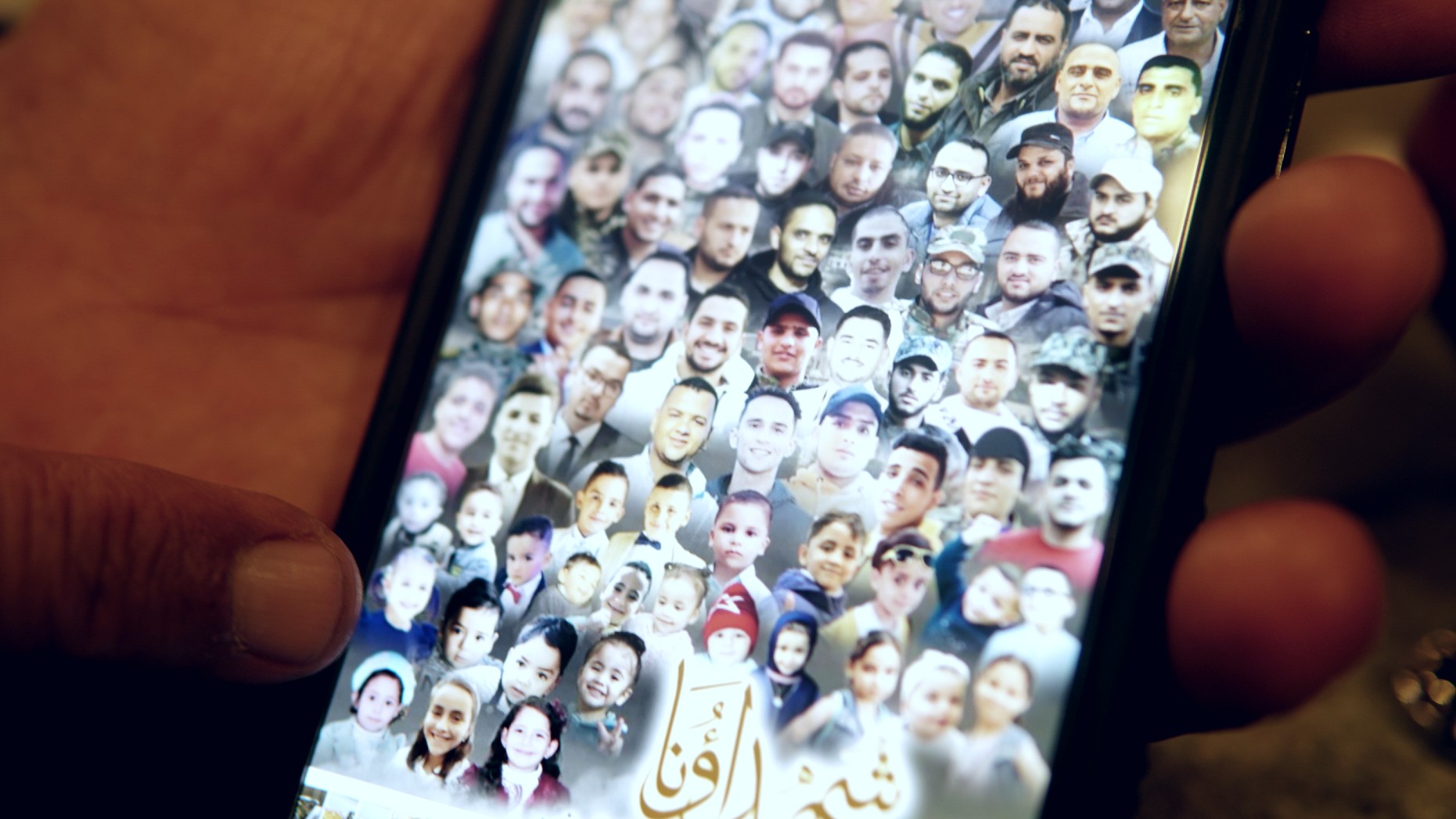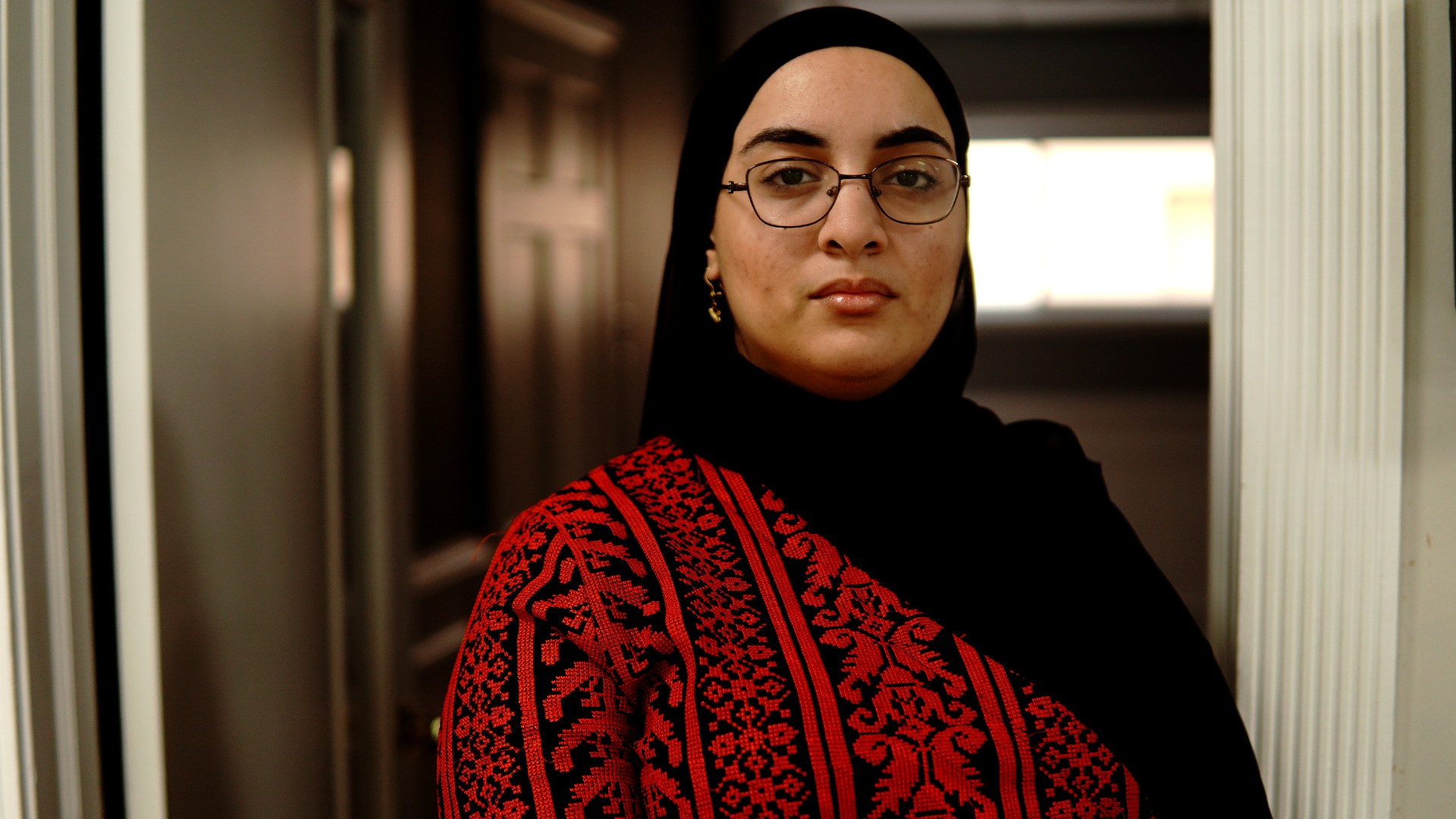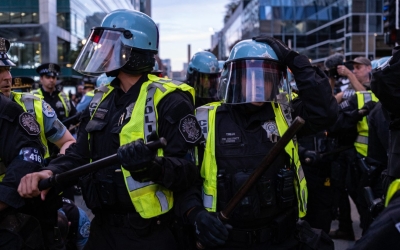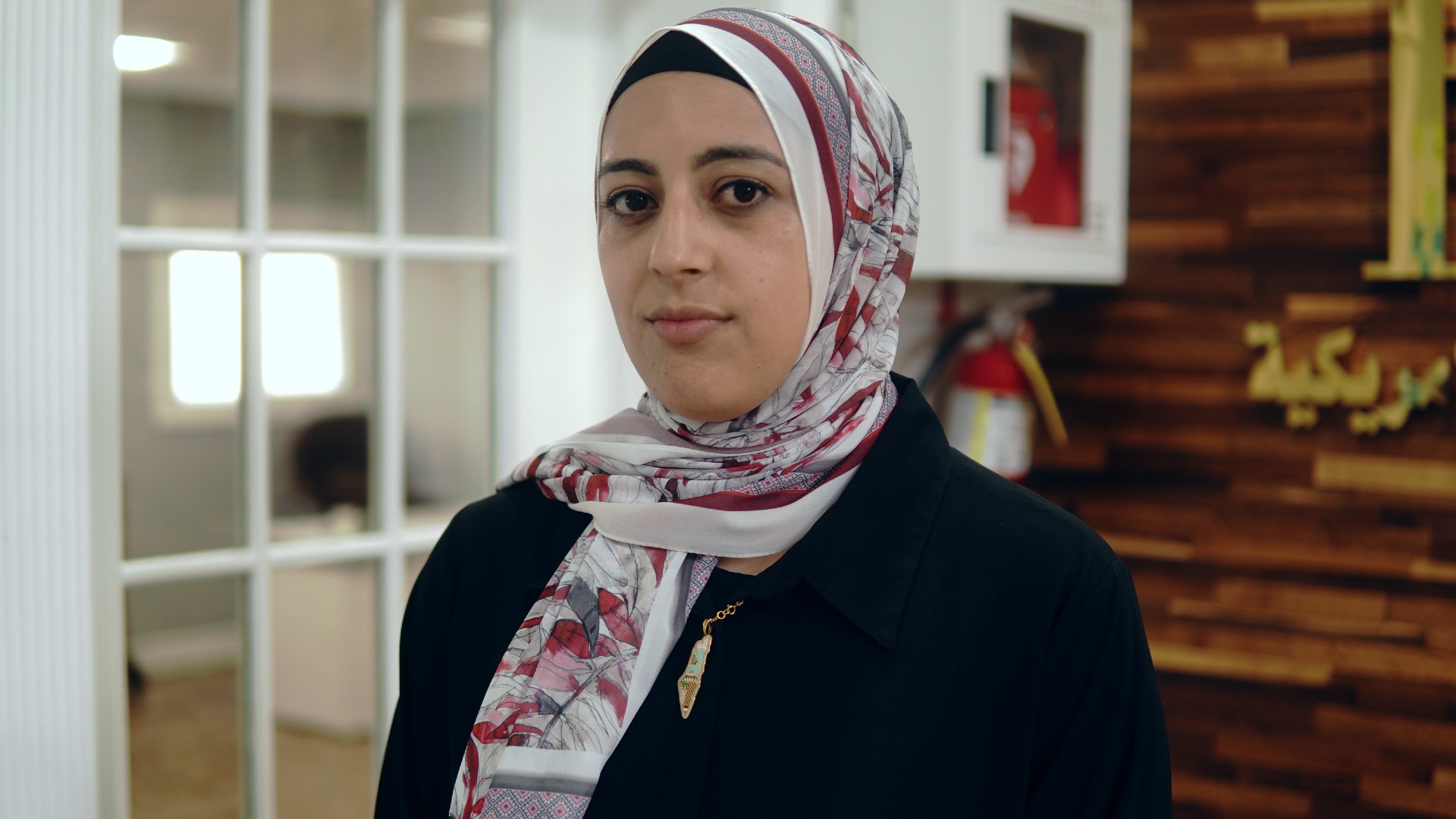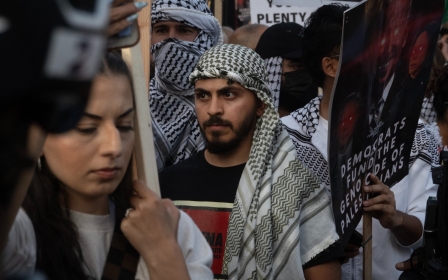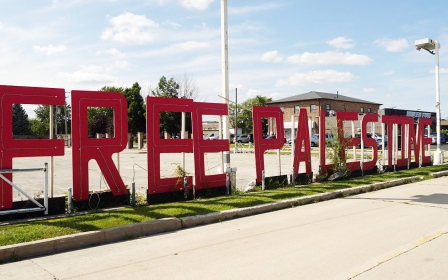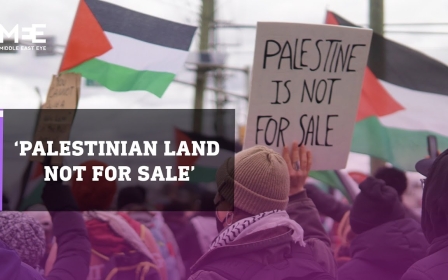'I call my brother knowing he won't pick up': The anguish felt by Palestinian Americans over Gaza
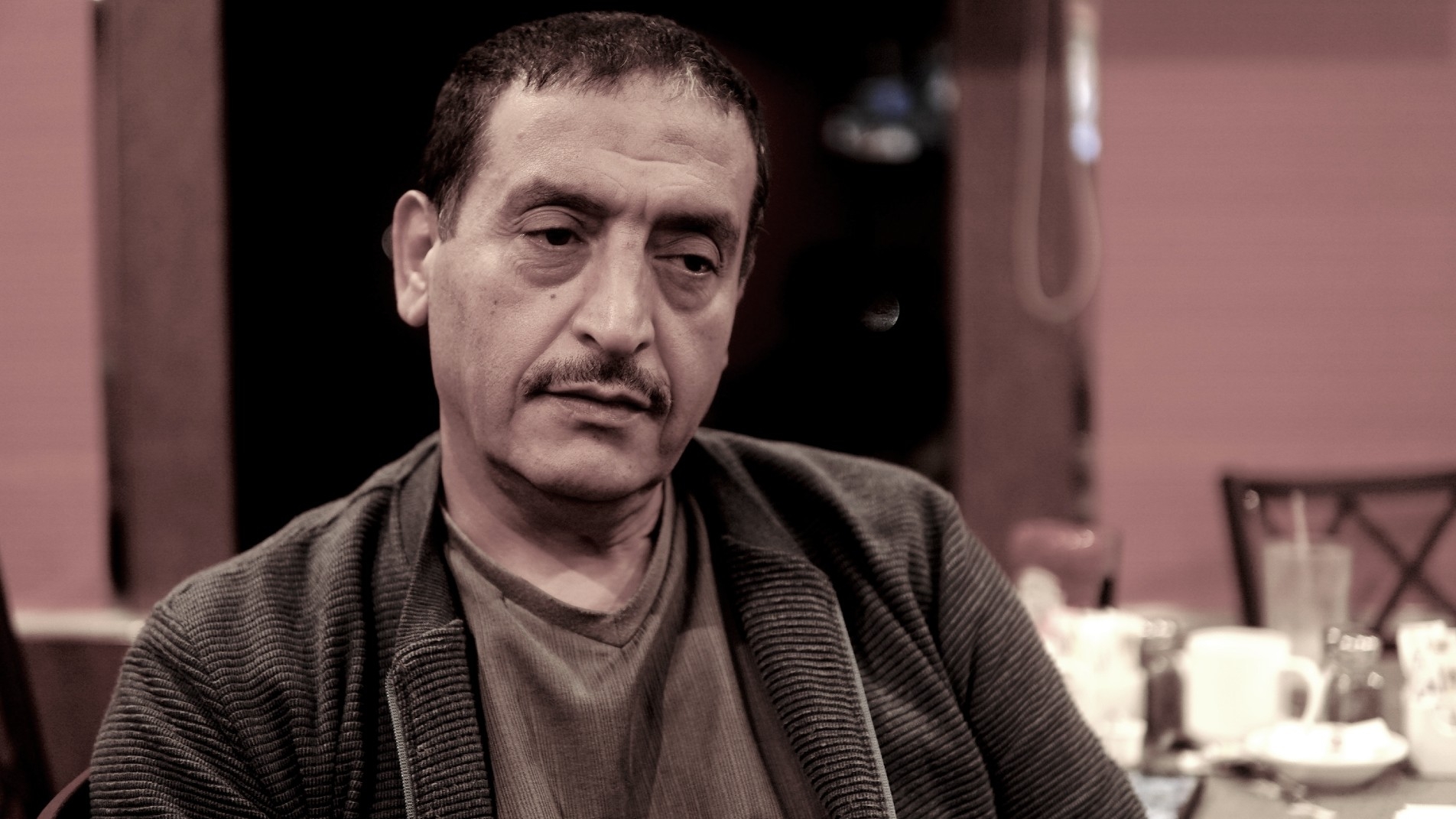
Like thousands of Palestinian Americans, Nasser checks his phone the moment he wakes up and immediately reads the latest news updates from Gaza.
After scrolling through messages from friends and family, he turns to social media, trawling through photos and videos to find missing loved ones.
Sometimes, Nasser finds himself dialling his brother's number.
But the call doesn't connect.
And he knows why.
New MEE newsletter: Jerusalem Dispatch
Sign up to get the latest insights and analysis on Israel-Palestine, alongside Turkey Unpacked and other MEE newsletters
On 22 November, the Israeli military bombed the building in which his brother and more than three dozen other family members were living.
In total, 42 family members - men, women and children - were immediately buried under the rubble.
But because his brother's body, like so many others, was not retrieved from under the heaps of concrete and twisted steel, Nasser is still holding out on the remote possibility that his beloved brother may have survived.
"Sometimes I be calling my brother. He's dead. I know it," Nasser, who asked to be identified by his first name only, told MEE.
'I can't believe this happened. I know they did it, but I cannot believe it. I can't take it'
- Nasser, Palestinian American
"I can't believe this happened. I know they did it, but I cannot believe it. I can't take it," he added.
The UN estimates that as many as 10,000 people are buried under the rubble in Gaza, and with them, closure for their surviving loved ones.
Nasser says the attack on their building came just weeks after another residential tower housing another part of his family had been levelled by the Israelis.
Thirty-three members of the family were killed in that assault in the second week of October.
Then came two attacks in November that saw 121 members of his extended family disappear overnight.
In early October, the Gaza Media Office (GMO) revealed that Israel had erased around 902 Palestinian families from the civil register over the past 12 months. It said that Israel had “exterminated 1,364 Palestinian families by killing all their members, leaving only one individual per family, and similarly wiped out 3,472 Palestinian families, leaving just two individuals per family.”
At least 16,000 children and 11,000 women have been killed by Israel since the war began.
At first, Nasser didn't realise it, but following several visits to the emergency room for panic attacks, he understood he wasn't coping.
"Imagine you lose everyone in your family. I can't believe what I lost. Up to now, I can't believe what they did," Nasser said.
Layers of trauma
As Israel continues its war on Gaza and expands its military operations north into Lebanon and air strikes pummel Yemen, analysts have warned of regional war after Iran fired a barrage of missiles at Israel on 1 October.
And for the first time in more than 20 years, Israeli fighter jets bombed a West Bank city, striking a cafe in the Tulkarm refugee camp where at least 18 people were killed.
Activists and community organisers say the levels of trauma amongst Palestinian Americans over the normalisation of the killings of their loved ones has left a community in tatters.
In towns across northern New Jersey, where an estimated 20,000 Palestinian Americans live, organisers say the community is fielding mammoth levels of personal tragedy and loss, all the while surviving in an environment of rising Islamophobia and anti-Palestinian racism.
In towns like Teaneck, Palestinian land in the occupied West Bank is openly showcased to prospective Israeli-American settlers at real estate fairs at synagogues.
In other towns, along the commuter line to New York, a sizeable pro-Zionist community has decorated their yards with "We Stand with Israel" signs.
Many Palestinians arrived in the US from Gaza after their families were made refugees during the 1948 Nakba.
"It's the story of every Palestinian we've been, you know, struggling against the Zionist occupation of Palestine from 1948 until now and all that they want to talk about is October 7," Mohammed Abusalim*, a Palestinian American from New Jersey, told MEE.
"They forget that our story started 75 years before that. Nobody cares. Nobody tried to find a solution," Abusalim said.
"We are not allowed to go home," he added.
Nasser's family, too, were from Beershaba, a district in southern Palestine, before the creation of Israel forced them to flee to Gaza where they ended up in the Jabalia refugee camp.
During Israel's current war on Gaza, Jabalia has been hit by multiple air strikes, with just two of the strikes taking the lives of at least 105 people. Palestinian officials say 70 percent of the camp has been destroyed.
In Union, where several Palestinian families who hail from Gaza live and often congregate at the local mosque, the community has been struggling to keep up with the developments, all the while handling hardships and absorbing daily humiliations, often of an unfathomable nature.
Take the story of Ahmed Alhussaina, who was in Gaza for several years as a professor at al-Israa University, south of Gaza City.
Alhussaina, an American citizen, says he decided to take his immediate family to Egypt when Israel began incessantly bombing his residential area. In November 2023, the Israeli military had taken over his university, using it as a detention and interrogation base.
After escaping the bombing of his home in Gaza City, on 14 November, he decided to get out.
He says the escape was a gruelling affair.
'One week after I left, they bombed the whole block. Two buildings. We lost the 144 people of my family in one night'
- Ahmed Alhussaina, Palestinian American
While walking towards the Rafah border, he had to cover his young daughter's eyes as they side-stepped decomposing bodies on the road.
Later, Alhussaina, along with other men, were made to strip naked for Israeli troops, and he said others were used as human shields to prevent Palestinian fighters from firing at them.
"One week after I left, they bombed the whole block. Two buildings. We lost the 144 people of my family in one night. My brother was just alone when he went to the masjid. He lost his son and his grandchildren," Alhussaina said.
"My brother and my sisters lost their kids ... the bodies are still under the rubble. Until now I think they only got like eight bodies out," Alhussaina added.
On 17 January, just over two months after Alhussaina left, the Israeli military detonated 315 mines to level al-Israa University. In so doing, the university buildings together with around 3,000 artefacts dating back as far as the Roman era were buried under the rubble.
With the destruction of the university, Israel had now destroyed or damaged all of Gaza’s centres of higher learning.
"Nothing is standing. It's all gone. It's like a dream. You wake up and there's only sand there," Alhussaina said.
He is now in New Jersey with his family.
A zero-sum game
Further north, in Paterson, also known as Little Ramallah, the colours green, red and black that make up the Palestinian flag hang from street poles on the city's main street.
Restaurants, barbershops and vape shops are stocked with banners and posters in solidarity with those back in the occupied Palestinian territories.
Here, too, everyone knows someone who has been injured, maimed, killed or disappeared over the past 12 months, either in Gaza or in the occupied West Bank, where Israel has ramped up operations since October 2023.
Several members of the community in Paterson, too, have yet to return from Gaza, not because they cannot, but because they refuse to leave others behind.
Take the story of 55-year-old Fares Abufares, who travelled to Gaza in early September 2023 to see his mother, sisters, brothers, and extended family, whom he hadn't seen in two years.
When the bombardment of Gaza began in October, he refused to use his American passport to exit the besieged Strip and became a volunteer with Health, Education, Aid, and Leadership (HEAL) Palestine and has been assisting people for the past 13 months in Gaza.
His daughter, Duaa, said she understood and respected her father's motivation to stay behind, but it has left her mother, and three sisters terrified for his life. Several members of the family have already been killed in air strikes.
"He says that his life shouldn’t be more important than a Palestinian just because he is American," Abufares' daughter Duaa, told MEE.
"It's been hard, honestly, for the past 12 months. It's very hard, but I'm also kind of angry, seeing the situation, knowing, feeling that no one cares about my own people," Duaa, 25, added.
"It's been depressing in a way too, because seeing all those people, all my people getting hurt, getting killed and knowing the fact that my dad's there in the line of fire. I understand why he's there, but, yeah, it's been very hard," she added.
Duaa says beyond the concern over his safety, her father, a delivery truck driver, was also the main breadwinner in the family. Duaa says his decision to remain in Gaza has altered the family's finances, underlining, she says, the many layers of impact and trauma the invasion of Gaza has had on the larger community in the US.
"I understand because if it was my mom who was over there, and if I was there, and if she can't come with me, I'm not leaving either," Duaa said.
Basma Bsharat can scarcely believe the level of trauma her community has had to face over the past 12 months.
Bsharat says the Palestinian American Community Center (PACC) in Paterson, where she functions as the Palestine education director, has been a hub of endless activity since October 2023.
Soon after Israel began bombing Gaza on 7 October, following the Hamas-led attacks on southern Israel, the organisation immediately sprung into action, as they had done before, to collect aid to Gaza.
As the bombardment expanded, PACC was facilitating the exit of Palestinian Americans from the territory into Egypt.
By then, several New Jersey-based Palestinians had lost hundreds of family members in Israeli air strikes that targeted universities, hospitals and residential complexes.
'People are angry, people are upset, people are in mourning, constantly, but I think people are also more inspired to take more action'
- Basma Bsharat, Palestinian American
PACC also lobbied mainstream media to carry Palestinian voices, and made pleas to local and state representatives to withdraw their inexhaustible support for Israel.
Bsharat said these efforts were combined with other actions like protests and vigils, and later group therapy sessions for Palestinian Americans to help them through the shocking images and videos on social media and the never-ending dehumanisation by politicians and the mainstream media.
The endless stream of videos of beheaded babies, of mutilated bodies hanging from demolished buildings and mass graves across Gaza may have left a community traumatised, but it has moved a new generation of Palestinian Americans to take their destiny into their own hands.
"It has definitely been a turning point for the community ... it's forced everyone to really reevaluate, first of all, who our allies are and, secondly, who supports us," Bsharat says.
This fraught situation has led many to turn to religion and the resilience of those in Gaza as a way to find purpose, particularly within a political context that offers little respite to Palestinians.
The level of grief has also prodded the community to hold teach-ins and workshops as a means to educate, but also as a way to cope and process the unfolding calamity thousands of kilometers away.
"People are angry, people are upset, people are in mourning, constantly, but I think people are also more inspired to take more action," Bsharat added.
In New Jersey, the story is no different from those narrated in other parts of the country, where Palestinian Americans have also received the proverbial cold shoulder from their political representatives but have also seen an outpouring of popular support from students, anti-war activists and an overwhelming majority of the international community, including international institutions like the International Court of Justice (ICJ).
In January, the ICJ ruled that Israel was committing a "plausible genocide" in Gaza.
"And just knowing that the people of Gaza are resilient, they're not giving up, and they're not, you know, just bowing down ... I think we find, we find inspiration from them," Bsharat said.
"Their strength and their resilience and their continued stubbornness to not give up means we have no right to give up either," she added.
*Name changed due to security concerns.
Middle East Eye delivers independent and unrivalled coverage and analysis of the Middle East, North Africa and beyond. To learn more about republishing this content and the associated fees, please fill out this form. More about MEE can be found here.


